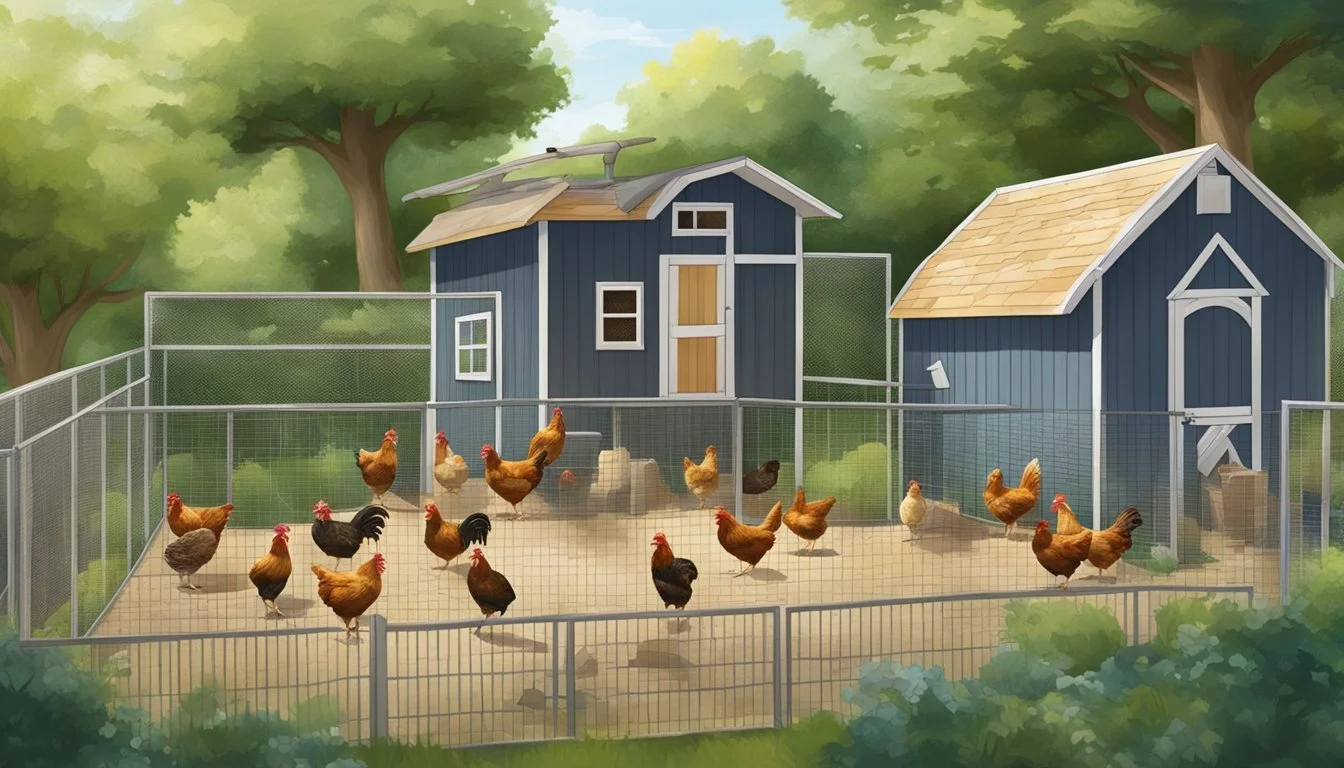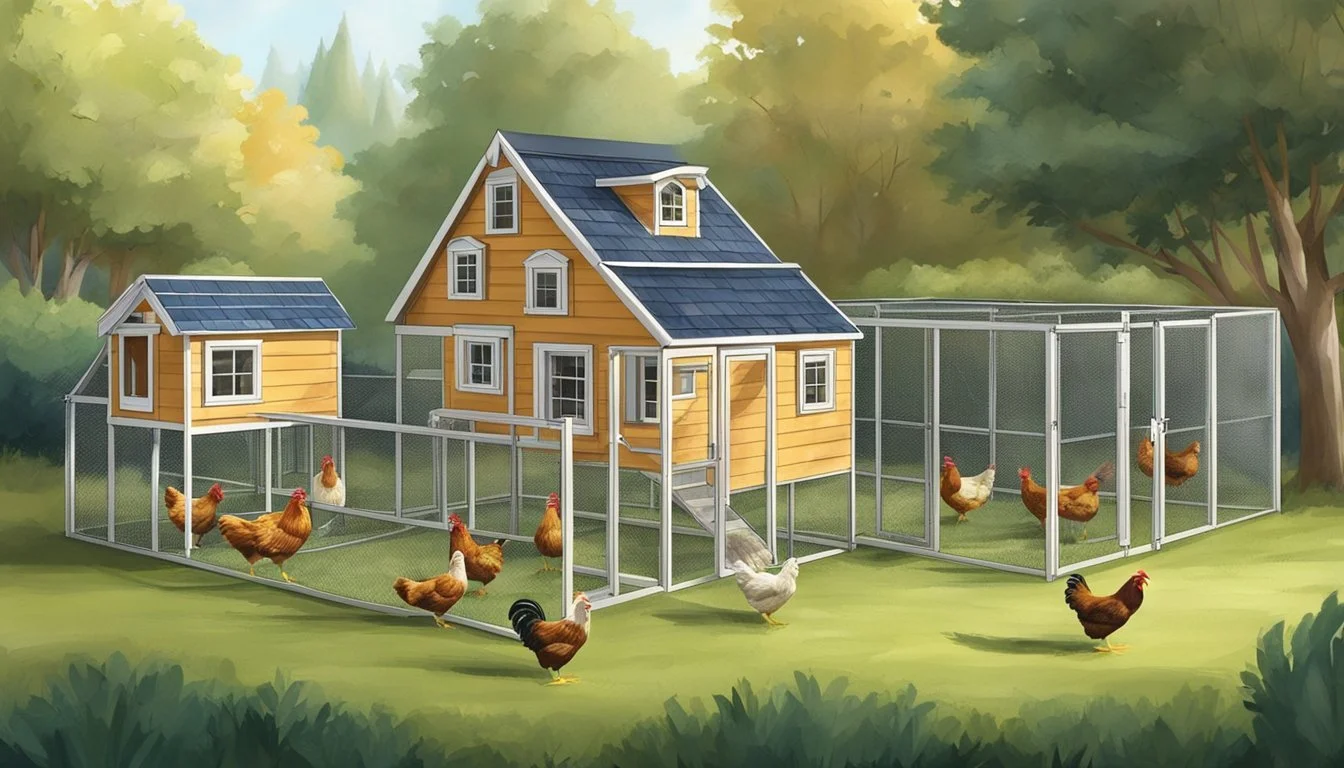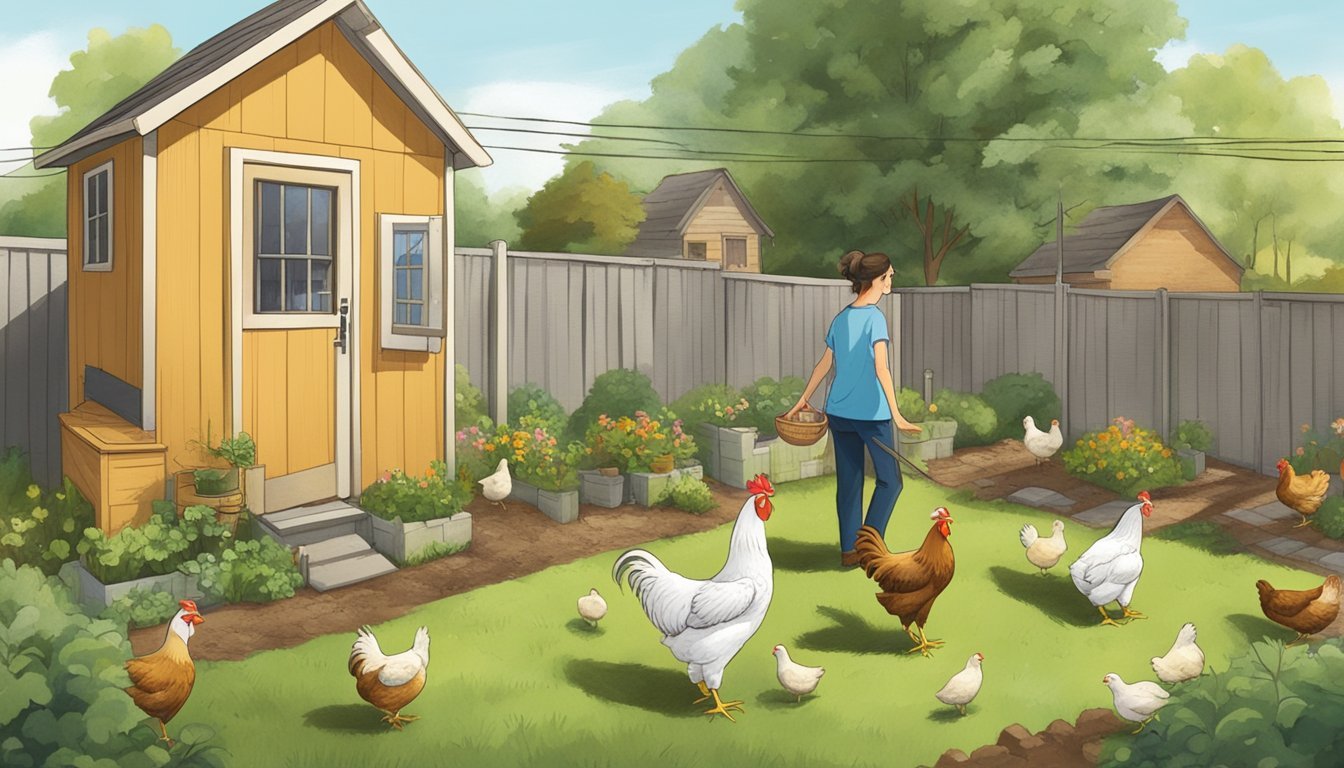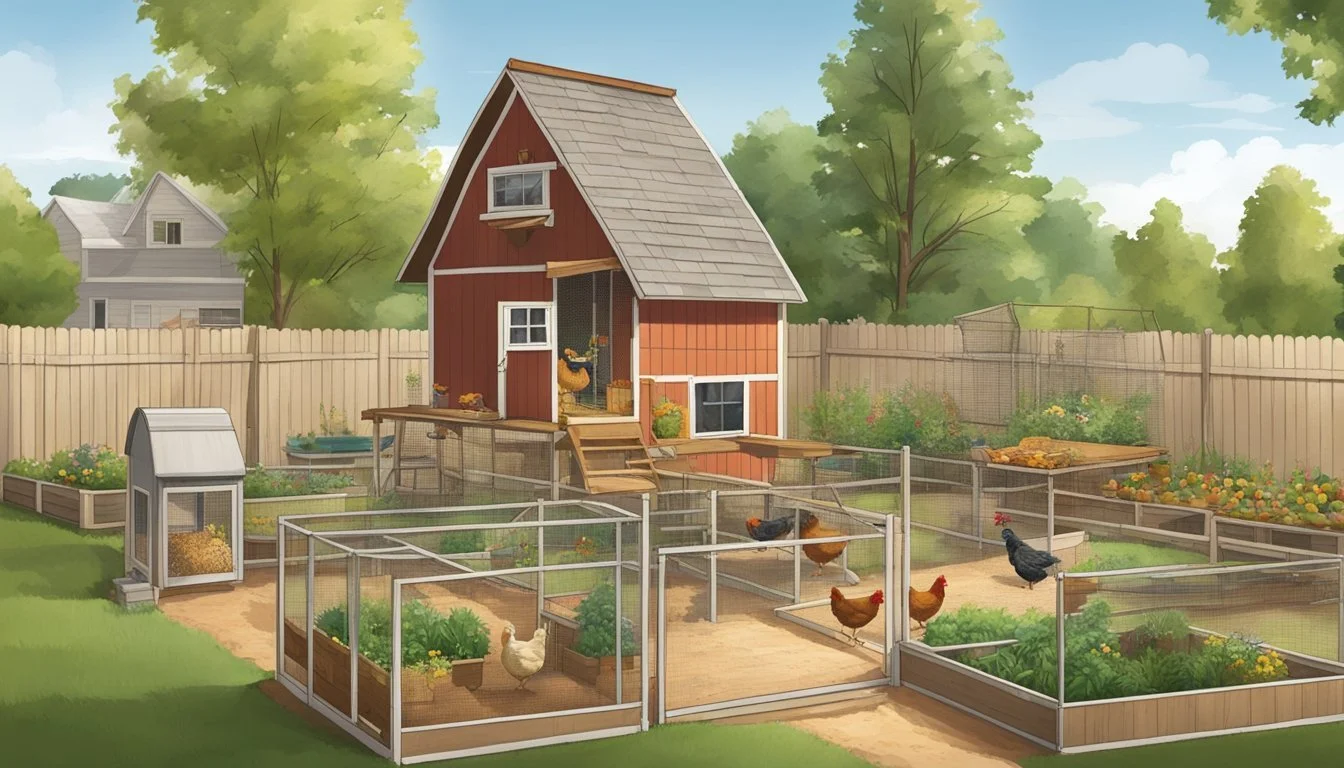Keeping Backyard Chickens in Aurora, CO
Essential Guidelines for Beginners
Urban agriculture has become an appealing option for residents looking to connect with their food sources, and keeping backyard chickens in Aurora, Colorado, is a subject of increasing interest. The city has laid out specific guidelines to facilitate this practice, allowing residents to maintain a limited number of hens on their property. The prospect of fresh eggs and the educational opportunities that come with raising chickens are driving more Aurorans to explore this eco-friendly activity.
However, maintaining an urban coop comes with regulations aimed at ensuring animal welfare and neighborhood tranquility. In Aurora, a city permit is mandatory for owning chickens, reflecting a controlled approach that balances urban farming desires with community standards. The city prohibits roosters, minimizing the potential for noise disturbances, and restricts the number of hens to prevent overcrowding and maintain hygiene.
These ordinances are in place not only to oversee the humane treatment of chickens but also to address any concerns neighbors might have regarding such practices. For those interested in pursuing backyard chicken farming, adhering to the Aurora-specific ordinances is crucial. This underscores Aurora's commitment to supporting sustainable practices while preserving the quality of life within the community.
Understanding Local Laws and Regulations
When considering starting a backyard chicken flock in Aurora, CO, residents must be well-informed about the specific local laws and regulations. These rules ensure the welfare of the chickens, address public health concerns, and mitigate any potential nuisance to neighbors.
Aurora Chicken Ordinance Essentials
In Aurora, residential property owners are permitted to keep chickens, but they are subject to certain restrictions. Roosters are prohibited due to noise concerns. The maximum number of chickens allowed is six per household. The City Council enforces these ordinances to balance urban agriculture with neighborhood aesthetics and safety.
Permit Requirements and Acquisition
A permit is required to legally keep backyard chickens in Aurora. Residents must apply for this permit through the local city government offices. If the property is a rental, written consent from the landlord is necessary. The process may include a permit fee, and the permit must be renewed periodically as per city regulations.
Zoning and Property Guidelines
Aurora's zoning laws dictate where chickens can be kept. Chickens are allowed in agricultural and rural-agricultural zones, with efforts to expand to most of the city recently being defeated. The coops must be positioned in the rear yard, and they need to be surrounded by an opaque fence that meets the fencing requirements established by the city.
Requirement Details Coop Size Minimum of 2 square feet per chicken Maximum Floor Space Cannot exceed 120 square feet Ventilation Coops must be properly ventilated Maintenance Accessibility Coops should be easy to access, clean, and maintain
Neighborhood and HOA Considerations
Residents should consult their neighborhood associations or Homeowners' Associations (HOA) because they may have additional restrictions or requirements for the keeping of chickens beyond those enforced by the Aurora City Code or Arapahoe County regulations. It is vital to adhere to these guidelines to prevent disputes and ensure that backyard chicken activities remain compliant with all governing entities.
Designing and Setting Up Chicken Coops
When setting up a chicken coop in Aurora, it is crucial to adhere to specific spatial, structural, and environmental guidelines to ensure the safety and health of your backyard chickens.
Sizing and Space Specifications
The design of a chicken coop should prioritize space efficiency and adherence to local regulations. Homeowners in Aurora can have up to six chickens, with larger properties allowed to house more. Each bird requires a minimum of four square feet of floor space inside the coop and ten square feet in an outdoor enclosure. Overall, the coop's floor space should not exceed 120 square feet to keep the environment manageable and sanitary.
Per Bird: 4 sq ft (coop), 10 sq ft (run)
Maximum Total Area: 120 sq ft (coop floor space)
Features of a Predator-Resistant Coop
A predator-resistant chicken coop is essential for safeguarding backyard chickens from common predators such as raccoons, foxes, and birds of prey. Construction recommendations include:
Walls and flooring secured with sturdy mesh wire or hardware cloth
Elevated coops with a raised foundation to prevent digging predators
Lockable doors and secure latches that are resilient against clever predators
Ventilation and Insulation for Weather Concerns
Chickens require a properly ventilated space to thrive, especially in regions with variable weather conditions like Aurora. Adequate ventilation ensures a constant supply of fresh air and prevents the buildup of ammonia from droppings. A rule of thumb is one square foot of ventilation per bird. To address temperature variations:
In moderate climates, include 1 sq ft of ventilation per chicken
In hotter climates, increase ventilation up to 2-3 sq ft per bird
Insulate the coop to protect from cold weather without compromising ventilation
By following these guidelines, one can create a secure, healthy, and comfortable environment for backyard chickens to live and lay in Aurora, CO.
Chicken Care and Management
When raising backyard chickens in Aurora, Colorado, the health and productivity of the poultry depend on proper feeding, disease prevention, and a strict sanitation regime.
Feeding and Nutrition
A balanced diet is paramount for the chickens' growth and egg production. They should have access to commercial poultry feed that meets their nutritional needs.
Layer pellets for egg-laying hens
Grit to aid in digestion
Clean water should always be available
Feeding table scraps should be done cautiously to prevent dietary imbalances. Avoid toxic foods like avocado, chocolate, and salty items.
Health and Disease Prevention
Chickens are susceptible to various diseases; hence, proactive measures are essential.
Vaccination against common diseases
Regular deworming and parasite control
Immediate isolation of sick birds to prevent the spread of disease
The Aurora Animal Care Division can provide local guidelines and assistance with poultry health issues.
Daily Maintenance and Sanitation
Consistent upkeep is vital to keep chickens in a sanitary condition.
Daily:
Collect eggs
Refill feeders and waterers
Remove droppings
Weekly:
Clean and disinfect the coop
Check for external parasites
Ensure nesting boxes are clean
Composting chicken waste can effectively manage manure. Adequate fencing is essential to protect from predators. Regular coop inspections are required to maintain a clean and secure environment for your feathered friends.
Legal and Ethical Considerations
Residents in Aurora, CO considering backyard poultry must navigate various laws and ethical standards that regulate the number and type of birds allowed, how to mitigate nuisances, and the proper treatment of the animals while considering the impact on neighbors.
Number and Type of Chickens Allowed
In Aurora, the law permits up to six chickens for single-family homes, with the stipulation that they must be hens—roosters are prohibited due to noise concerns. Permits are mandatory, and homeowners in residential zones need to comply with specific coop requirements to ensure the animals' safety from predators like raccoons. Ducks and other poultry types may also be subject to similar rules, but this information should be verified with city ordinances.
Breed Restrictions: While general permits allow for the keeping of chickens, some breeds may be better suited to the climate and residential living than others. It is advised to research and select breeds that are known for being quieter and less prone to causing disturbance.
Age Considerations: Adult chickens are often preferred over pullets (young hens), as their noise levels and behaviors are more predictable and typically more neighborhood-friendly.
Dealing with Potential Nuisances
To ensure that keeping chickens does not become a nuisance to neighbors, the coop must be properly ventilated, kept neat and sanitary, and placed at least 15 feet from the property line. This helps to control offensive odors and maintain a healthy environment for both the chickens and the surrounding community.
Waste Management: Regular cleanup of manure and proper disposal are essential to prevent any unpleasant smells or attraction of vermin.
Noise Control: Since roosters are not allowed, noise is usually less of an issue, but choosing the right breed and providing an adequate environment can further reduce potential disturbances.
Animal Welfare and Neighbor Relations
Ethical considerations include ensuring the chickens' welfare, which encompasses providing a coop that shields the birds from weather extremes and potential predators. Neighbor relations might be strained if chickens escape onto other properties, so secure fencing is a must. The prohibition of slaughtering chickens in residential areas must be respected.
Animal Welfare: Chickens must be provided with sufficient space, clean water, and the proper diet to prevent diseases, such as salmonella, which could also affect human handlers.
Neighbor Relations: Communication is key. Residents should inform and, if necessary, work with their neighbors to mitigate any concerns regarding the keeping of chickens, and take action if issues like noise or odors arise.
Chickens provide many benefits, but responsible ownership involves adhering to the legal framework and upholding high ethical standards in regard to animal welfare and maintaining positive relations with neighbors.
Community Engagement and Resources
Aurora has fostered a robust network for backyard chicken enthusiasts to share knowledge, resources, and experiences. This section outlines the avenues for connecting with fellow chicken keepers, educational resources available, and the role of digital platforms in strengthening this community.
Connecting with Local Chicken Keepers
Residents of Aurora have various ways to connect with local chicken keepers to learn and share experiences. Local groups often meet to discuss best practices and assist newcomers to the hobby. For instance, in the community along E. Alameda, local workshops might be organized where experienced chicken owners can offer advice on coop building, chicken care, and local regulations to newcomers.
Workshops and Educational Materials
Educational resources are readily available to those interested in the state of backyard chicken keeping in Aurora. Workshops are typically conducted by local agricultural organizations or chicken keeping advocates. Here, individuals can gain valuable information on maintaining the health and safety of their chickens. Additionally, printed and digital materials serve as a supplement for learning, often provided at these events or available for download online.
Online Forums and Social Media
Forums on the internet constitute a significant part of the chicken keeping dialogue. Platforms such as Facebook, specifically dedicated Facebook pages and groups, are home to Aurora's chicken keeping community. These online spaces provide swift responses to queries and a place to share updates regarding chicken keeping in Aurora, Denver, and surrounding areas. They also offer an easily accessible repository of information and experiences shared by members of the chicken keeping community.
Additional Considerations for Backyard Chickens
Before diving into the nuances of backyard poultry farming, prospective and current chicken owners in Aurora should recognize breed suitability, purpose of rearing, and the shifting responsibilities with seasons.
Choosing the Right Chicken Breeds
When selecting chicken breeds, consider the climate of Aurora along with the purpose of the chickens. For egg production, Leghorns and Rhode Island Reds are robust choices due to their hearty laying capabilities. Families may prefer Plymouth Rocks or Orpingtons, known for their docility and kid-friendliness. It's important to remember that while Aurora permits the keeping of chickens, roosters are prohibited to minimize noise disturbances, so choosing hens or pullets is necessary.
Rearing Chickens for Eggs or Meat
Individuals raising chickens for eggs will need to ensure appropriate nesting boxes and maintain a consistent light schedule to encourage laying; 14 hours of light per day is ideal, which may require artificial lighting at dusk or dawn. For those interested in rearing chickens for meat, selecting fast-maturing breeds such as Cornish Crosses is vital. Regardless of the purpose, all chickens require secure housing to protect from predators, including wild ducks and geese common to Colorado.
Seasonal Care and Changing Needs
Chickens demand differing levels of care with the changing seasons. During colder months, they require a well-insulated coop, free from drafts yet ventilated. Heavier breeds are more suitable for cold resistance. Conversely, hot summers necessitate ample shade and water. Roosts and shelters must be cleaned regularly to prevent disease, with constant vigilance for signs of distress or illness, ensuring a healthy flock year-round.







